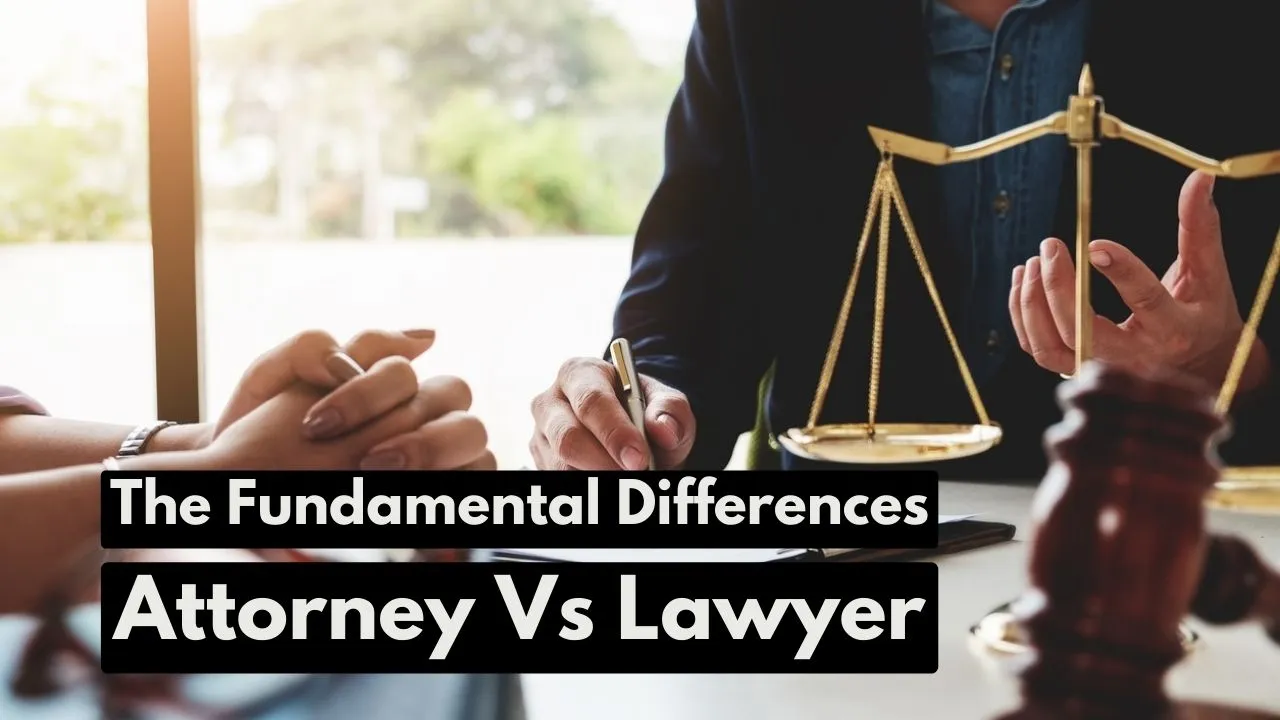The legal profession is rich with terminologies that can sometimes be confusing to the layperson.
Three common terms that are often used interchangeably are “lawyer,” “attorney,” and “esquire.”
While these words imply to professionals within the legal domain, they carry distinct meanings and implications.
And In this article (Lawyer vs. Attorney vs. Esquire), we’ll explore the differences between a lawyer, an attorney, and the honorific title “esquire” and gain a deeper understanding of their roles in the legal world.
Understanding Lawyer
A lawyer is a professional who has undergone legal education and training, qualifying them to provide legal advice, represent clients in legal matters, and uphold the law.
Lawyers can specialize in various legal areas, such as criminal law, corporate law, family law, intellectual property law, and more.
They are knowledgeable about the legal system, statutes, and case law, enabling them to offer comprehensive guidance to individuals and organizations.
➡️ Role and Responsibilities of a Lawyer
✅ Legal Advice and Consultation
Lawyers provide clients with legal advice and counsel on matters ranging from personal issues to complex business decisions. They review the details of a case, research applicable laws, and offer guidance on the best course of action.
✅ Legal Representation
In legal proceedings, lawyers act as advocates for their clients. They prepare legal documents, file motions, and represent their client’s interests in courtrooms or during negotiations.
✅ Document Preparation and Review
Lawyers draft and review various legal documents, including contracts, wills, deeds, and more. They ensure that these documents meet legal requirements and protect their clients’ rights.
✅ Negotiation and Mediation
Lawyers are skilled negotiators who can represent clients in settlement discussions and mediation to resolve disputes outside of court.
✅ Courtroom Litigation
When disputes cannot be resolved through negotiation, lawyers may litigate on behalf of their clients in court, presenting evidence and arguments to support their case.
Understanding an Attorney

The term “attorney” is often used interchangeably with “lawyer.”
Attorneys are licensed legal professionals in the legal field that provide counsel, advocacy, and representation to individuals, companies, and organizations.
They have received in-depth education and training, have chosen to focus on particular areas of law and uphold a strict code of ethics.
Lawyers represent clients in court, offer legal counsel, and defend the rights and interests of their clients.
They collect money for their services and ensure secrecy. When dealing with legal concerns, choosing the correct attorney is essential.
An attorney is a person who is legally qualified to represent others in legal matters.
In the United States, attorneys must have a Juris Doctor (JD) degree from an accredited law school and pass the bar exam in the state(s) where they wish to practice.
✅ Juris Doctor (JD) Degree
The Juris Doctor (JD) degree is a professional doctorate in law. It is a prerequisite for becoming an attorney in the United States.
✅ Licensing and Bar Exam
To practice law as an attorney, individuals must be licensed by the state(s) they intend to work in. The bar exam tests candidates on their knowledge of the law and legal procedures.
Different Types of Attorneys
Attorneys can specialize in various areas of law, such as criminal defense, corporate law, environmental law, immigration law, and more. Each specialization requires a deep understanding of the specific legal area.
➡️ Role & Responsibility Of Attorney
In the legal system, an attorney, usually referred to as a lawyer or legal advice, plays an important function.
Lawyers are essential in defending the rights of their clients and enforcing the rules of justice.
The following are some important facets of their position and duties:
✅ Legal Representation
In a variety of legal situations, attorneys represent people, companies, or organizations. They advocate for their client’s interests by offering advice, guidance, and support.
✅ Client Consultation
Attorneys meet with clients to learn about their goals and legal concerns. They compile pertinent data, assess the circumstance, and provide legal counsel on the best course of action.
✅ Research and Analysis
To comprehend the pertinent laws, rules, and precedents that apply to the issues of their clients, attorneys engage in significant legal research.
They use this research to develop persuasive arguments and plans of action.
✅ Drafting Legal Documents
Lawyers draft legal papers such as pleadings, motions, wills, contracts, and agreements. In formalizing legal connections and making arguments in court, these documents are essential.
✅ Negotiation
To secure settlements or plea deals, attorneys frequently negotiate with opposing parties. Effective negotiation techniques are crucial for settling conflicts outside of court.
✅ Trials and Legal Representation
Attorneys defend their clients in court during trials, hearings, and other legal proceedings. To bolster their clients’ claims, they produce proof, question witnesses in cross-examination, and present arguments in court.
✅ Legal Strategy and Advice
To address the unique circumstances of their clients, attorneys create customized legal tactics. They give clients advice on the advantages and disadvantages of certain courses of action.
✅ Ethical Obligations
It is the responsibility of attorneys to uphold the highest ethical standards and represent their client’s interests. They must uphold customer privacy, steer clear of conflicts of interest, and follow established standards of conduct.
✅ Advocacy
Attorneys act as zealous defenders of their client’s rights and interests within the parameters of the law.
✅ Continuing Legal Education
To preserve their expertise and knowledge in their practice areas, attorneys must keep themselves up to date with changes in legislation and judicial precedents through continuing legal education (CLE).
✅ Mediation and Alternative Dispute Resolution (ADR)
Attorneys might take part in ADR and mediation procedures in addition to litigation to assist clients in resolving conflicts outside of court.
✅ Corporate Compliance and Legal Advice
Attorneys may advise firms on how to comply with laws and regulations, prepare contracts, and help with mergers and acquisitions.
It’s crucial to remember that an attorney’s precise position and obligations can change based on their area of expertise (such as criminal law, civil law, corporate law, or family law) and the country in which they operate.
Regardless of their area of expertise, lawyers are committed to respecting the law, defending the rights of their clients, and achieving fair and just outcomes in the courtroom.
Lawyer Vs Attorney : What’s The Difference Between Lawyer And Attorney?
![Role and Responsibilities of an Esquire [ Esquire Title, Esquire Definition & More ]](https://thelegalstories.com/wp-content/uploads/2023/05/shutterstock_1038948943-1.webp)
Although the terms “attorney” and “lawyer” are sometimes used interchangeably, there is little distinction between the two.
An attorney is a lawyer who is permitted to practice law in a specific country. A lawyer is often someone who has been trained in law and has passed the bar test.
In the US, “attorney” is more frequently used than “lawyer.” This is because whereas “lawyer” is more generic, the word “attorney” has a specific legal connotation. In Canada, the terms “attorney” and “lawyer” are synonymous.
key differences between lawyers and attorneys:
| Characteristic | Lawyer | Attorney |
|---|---|---|
| Education | Trained in law and has passed the bar exam | Trained in law and has passed the bar exam |
| Authorization to practice law | Authorized to practice law in a particular jurisdiction | Authorized to practice law in a particular jurisdiction |
| Common usage | More general term | More specific term |
| Example | “I am a lawyer.” | “I am an attorney at law.” |
In most cases, it is not necessary to distinguish between lawyers and attorneys.
However, if you are seeking legal representation, it is important to make sure that the person you are hiring is authorized to practice law in your jurisdiction.
Understanding Esquire

The term “esquire” has historical origins and was originally used in England to denote individuals of high social standing.
Over time, the title became associated with the legal profession.
The word “esquire” has a long and varied history. It originally came from the Old French word “escuyer,” which meant “shield bearer.”
An esquire was a young nobleman who assisted a knight in the Middle Ages. He would be in charge of carrying the knight’s shield and armor as well as other duties like errand running.
The definition of the word “esquire” has evolved over time. It was no longer used to describe a young nobleman by the 17th century. It was utilized as a formal title for a gentleman of great social status instead.
Lawyers, who were regarded as gentlemen by virtue of their profession, were also given this title.
The word “esquire” is now sometimes used differently in the US. Regardless of gender, it is now most frequently used as a title for lawyers. For other professionals like doctors and judges, it is occasionally used as a courtesy title.
It’s common to shorten the word “esquire” to “Esq.” The title is normally used after the person’s last name when utilized in writing. You might type “John Smith, Esq.” or “Jane Doe, Esq.” as an illustration.
Use of “Esq.” in the United States
In the United States, “Esq.” is often used as an honorific title for attorneys. It is typically placed after the attorney’s name, indicating their status as a member of the legal community.
How To Use the Esquire Title
The use of “Esq.” varies among regions and legal professionals. While some attorneys embrace the title, others may choose not to use it, considering it unnecessary.
➡️ Role & Responsibility Of Attorney
Depending on the company or organization they work for, Esquire’s roles and responsibilities can change.
The following are examples of typical roles and responsibilities:
✅ Providing legal advice and representation
Lawyers who have been trained in the law and are admitted to practice in a specific jurisdiction are known as squires. They are able to prepare legal papers, represent clients in court, and give legal advice to clients.
✅ Managing legal affairs.
A company’s or organization’s legal matters may also be managed by esquires. This includes duties including creating contracts, examining legal paperwork, and giving management legal advice.
✅ Advising on compliance matters.
Esquires can also give clients compliance-related advice. This includes making certain that clients adhere to all applicable laws and rules.
✅ Providing business development services.
Additionally, esquires can help clients with business development. This entails activities including spotting new business prospects, settling agreements, and controlling legal hazards.
Esquires may additionally have more specialized responsibilities in addition to these general roles and responsibilities, depending on their field of practice.
For instance, drafting corporate documents, mergers and acquisitions, and other corporate activities may fall under the purview of an Esquire with expertise in corporate law.
The defense of clients’ intellectual property rights, including patents, trademarks, and copyrights, may fall under the purview of an Esquire with expertise in intellectual property law.
Esquires have a variety of roles and responsibilities, some of which are onerous while others are tremendously rewarding. Successful esquires can have a significant impact on their client’s life as well as the organizations they work for.
Conclusion
In summary, while the terms “lawyer,” “attorney,” and “esquire” are related to the legal profession, they carry different implications. A lawyer is a qualified legal professional who can provide legal advice and representation.
An attorney is an individual who is legally qualified to represent others in legal matters, often used synonymously with “lawyer.”
“Esquire” is a title used primarily in the United States to denote a member of the legal community.
Understanding these distinctions can help clarify the roles and titles of professionals within the legal world.
FAQs Related Lawyer vs. Attorney vs. Esquire
Can an attorney also be a lawyer?
Yes, an attorney is typically a qualified lawyer who is licensed to practice law.
Is it necessary to use the title “Esquire”?
No, the use of the title “Esq.” is a personal choice and is not required for legal practice.
What is the educational path to becoming a lawyer?
To become a lawyer in the United States, one must obtain a Juris Doctor (JD) degree and pass the bar exam in the state(s) they wish to practice.
Are attorneys and lawyers the same in the UK?
In the UK, the term “solicitor” is used instead of “attorney,” but they serve similar functions.

![Role and Responsibilities of an Esquire [ Esquire Title, Esquire Definition & More ]](https://thelegalstories.com/wp-content/uploads/2023/06/Red-and-Black-Dark-Gamer-Sports-YouTube-Outro-1-1-2.webp)






![Fintechzoom.Com - Finance, Market, Info. [ FintechZoom ] https://thelegalstories.com/ The Legal Stories](https://thelegalstories.com/wp-content/uploads/2025/02/Freelancing-Promotion-Facebook-Cover-Photo-1-1-1.jpg)


